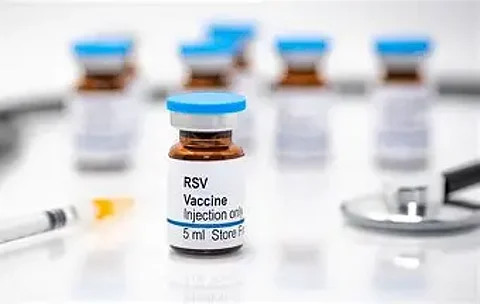

The UK Health Security Agency (UKHSA), in collaboration with Nottingham University Hospitals and other NHS trusts, has released new findings demonstrating the high effectiveness of RSV vaccines in preventing hospitalisation among older adults and infants in England.
A recent study titled “Effectiveness of RSV Vaccine Against RSV-Associated Hospitalisation Among Adults Aged 75 to 79 Years in England” found that the vaccine is approximately 82% effective in preventing hospital admissions due to respiratory syncytial virus (RSV) among this age group. It also showed strong protection for individuals with chronic respiratory conditions and those who are immunocompromised.
The findings support the RSV vaccination programme for older adults, introduced into the NHS schedule in September 2024. This programme offers the vaccine to people turning 75, along with a one-time catch-up campaign targeting all adults aged 75 to 79 years.
A separate study, “Vaccination in Pregnancy and RSV Hospitalisation in Infants in the UK”, published in The Lancet Child & Adolescent Health, revealed that maternal RSV vaccination was 72% effective in preventing RSV-related hospitalisation in newborns when the vaccine was administered more than 14 days before delivery.
As part of its rollout, the maternal RSV vaccination programme is offered from 28 weeks of pregnancy, aiming to protect infants—particularly those born in late summer and autumn—who are at higher risk of severe RSV-related illness during the peak season.
The latest vaccine uptake data released by UKHSA shows encouraging progress:
Among the older adult catch-up group (aged 75–79), coverage reached 62.9% as of June 30, 2025, up from 60.3% in March.
For the maternal programme, of the 36,657 women who gave birth in March 2025, 54.7% received the RSV vaccine.
Uptake varied across ethnic groups, with 73.3% of Chinese women vaccinated compared to 26.4% among Black and Black British Caribbean women.
Greta Hayward, Consultant Midwife at UKHSA, emphasized the importance of timely vaccination during pregnancy:
“Getting vaccinated during each pregnancy is the most effective way to protect newborns from RSV, especially since RSV is a major cause of bronchiolitis in the first months of life.”
Dr. Conall Watson, Immunisation Consultant at UKHSA, added:
“These findings provide strong reassurance for families and healthcare providers. The RSV vaccine protects both newborns and older adults from serious illness, and uptake is critical as RSV cases rise in autumn.”
UKHSA has also published its first RSV Annual Report, which provides a comprehensive overview of the 2024–2025 RSV season, including disease trends, vaccine coverage, and impact. Surveillance showed RSV activity began around mid-October 2024 (week 42), peaked in late November to early December (weeks 47–49), and returned to baseline levels by mid to late February 2025 (weeks 7–8).
Additional insights from UKHSA’s primary care surveillance programme, which involves swabbing patients with acute respiratory infections across 300 GP practices in England, found:
The highest RSV positivity was in children under 5, peaking at 53.1% in mid-November (week 46).
Among those aged 75 and above, RSV positivity peaked at 18.5% in early December (week 49).
Hospital emergency department surveillance also confirmed that bronchiolitis cases in infants, the primary clinical manifestation of RSV, peaked in late November, aligning with national RSV trends.
UKHSA continues to urge all eligible individuals—older adults and pregnant women—to get vaccinated ahead of the upcoming RSV season to reduce hospitalisations and protect vulnerable populations.